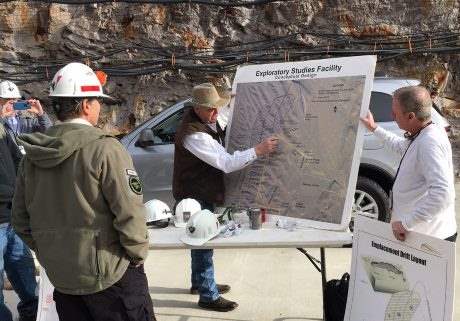The USA has a moral obligation to address its nuclear waste issue, and restarting the Yucca Mountain licensing process and committing to establishing an interim storage facility for used fuel will accelerate the fulfilment of that obligation, US Energy Secretary Rick Perry this week told House and Senate appropriations subcommittees.
 |
| Rick Perry (in the foreground) visited the Yucca Mountain site in March (Image: @SecretaryPerry) |
Perry addressed the House Appropriations Subcommittee on Energy and Water Development on 20 June and the Senate Appropriations Subcommittee on Energy and Water Development the following day, to present the Department of Energy's (DOE's) proposed 2018 budget. In his testimony to both committees, he said the need to address nuclear waste management was a "moral" obligation. "For too many years, the prior administration has literally kicked the can down the road on nuclear waste," he said.
The US administration's budget for fiscal 2018, which commences on 1 October, requests $28 billion for the DOE. Included in the request is $120 million to resume licensing at Yucca Mountain and to initiate a "robust" interim storage program, Perry told the committees. Of this, $110 million would be used to restart Nuclear Regulatory Commission (NRC) licensing activities for the nuclear waste repository, including funding for management, site operations and maintenance, as well as technical, scientific, legal and other support. $10 million would be used to initiate a "robust interim storage program" to complement the repository by developing a capability to accelerate removal of used fuel and high-level wastes currently being stored in sites in 39 states across the country. "An interim storage capability also adds flexibility to the system that will move materials from sites across the country to its ultimate disposition," he said.
Yucca Mountain in Nevada has since 1987 been named in the US Nuclear Waste Policy Act as the sole repository for disposal of the country's used nuclear fuel and high-level radioactive wastes. The DOE submitted a construction licence application for the project to the NRC in 2008, but the previous US administration subsequently decided to abort the project, appointing a high-level Blue Ribbon Commission to come up with alternative strategies.
The budget proposal also includes $703 million for nuclear energy - $313 million less than in fiscal 2017 - to continue "innovating new and improved ways to generate nuclear power", Perry said. Funding will be focused on early-stage research and development that enables innovation driven by the private sector. It also includes $20 million for early-stage R&D supporting advanced small modular reactor designs, Perry said.
Researched and written
by World Nuclear News




_52351.jpg)


_15863.jpg)






